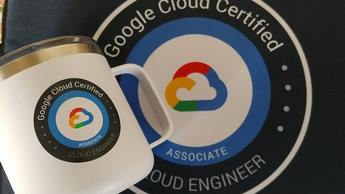
Professional Cloud Database Engineer: Professional Cloud Database Engineer
PDFs and exam guides are not so efficient, right? Prepare for your Google examination with our training course. The Professional Cloud Database Engineer course contains a complete batch of videos that will provide you with profound and thorough knowledge related to Google certification exam. Pass the Google Professional Cloud Database Engineer test with flying colors.

Curriculum for Professional Cloud Database Engineer Certification Video Course
| Name of Video | Time |
|---|---|
 1. Create GCP Free Trial Account |
6:03 |
 2. GCP Regions & Zones |
8:30 |
| Name of Video | Time |
|---|---|
 1. Types of Data |
6:26 |
 2. OLTP vs OLAP |
3:50 |
 3. Horizontal vs Vertical scalability |
3:18 |
 4. RTO& RPO |
6:33 |
 5. Database Design Consideration |
2:50 |
 6. Types of SQL & NoSQL |
4:15 |
 7. Different GCP Database Product |
4:30 |
| Name of Video | Time |
|---|---|
 1. RDBMS in GCloud |
3:06 |
 2. Introduction to Cloud SQL |
7:55 |
![Play Video: [Hands-on] Create Cloud SQL instance](/design/img/playBtn.png) 3. [Hands-on] Create Cloud SQL instance |
15:19 |
![Play Video: [Hands-on] Explore Cloud SQL Instance](/design/img/playBtn.png) 4. [Hands-on] Explore Cloud SQL Instance |
7:49 |
| Name of Video | Time |
|---|---|
![Play Video: [Hands-on] Connect with Public IP](/design/img/playBtn.png) 1. [Hands-on] Connect with Public IP |
13:06 |
![Play Video: [Hands-on] Connect using Cloud SQL Auth Proxy](/design/img/playBtn.png) 2. [Hands-on] Connect using Cloud SQL Auth Proxy |
7:58 |
![Play Video: [Hands-on] Connect using Private IP](/design/img/playBtn.png) 3. [Hands-on] Connect using Private IP |
11:34 |
![Play Video: [Hands-on] Add two kind of Users](/design/img/playBtn.png) 4. [Hands-on] Add two kind of Users |
9:22 |
![Play Video: [Hands-on] Secure Connection with SSL](/design/img/playBtn.png) 5. [Hands-on] Secure Connection with SSL |
6:45 |
![Play Video: [Hands-on] Connect with IAM - Service Account User](/design/img/playBtn.png) 6. [Hands-on] Connect with IAM - Service Account User |
9:18 |
![Play Video: [Hands-on] Migrate database from On-premise to Cloud SQL](/design/img/playBtn.png) 7. [Hands-on] Migrate database from On-premise to Cloud SQL |
11:02 |
| Name of Video | Time |
|---|---|
![Play Video: [Hands-on] Simulate Zonal failover](/design/img/playBtn.png) 1. [Hands-on] Simulate Zonal failover |
9:06 |
![Play Video: [Hands-on] Backup & Restore](/design/img/playBtn.png) 2. [Hands-on] Backup & Restore |
8:32 |
![Play Video: [Hands-on] Export Database](/design/img/playBtn.png) 3. [Hands-on] Export Database |
6:56 |
![Play Video: [Hands-on] Create Read Replica](/design/img/playBtn.png) 4. [Hands-on] Create Read Replica |
8:52 |
![Play Video: [Hands-on] Region Failover](/design/img/playBtn.png) 5. [Hands-on] Region Failover |
3:43 |
![Play Video: [Hands-on] Cloud SQL instance operation](/design/img/playBtn.png) 6. [Hands-on] Cloud SQL instance operation |
4:22 |
![Play Video: [Hands-on] Cloud SQL IAM Role](/design/img/playBtn.png) 7. [Hands-on] Cloud SQL IAM Role |
4:29 |
![Play Video: [Hands-on] Create Cloud SQL for PostgreSQL & connect](/design/img/playBtn.png) 8. [Hands-on] Create Cloud SQL for PostgreSQL & connect |
6:04 |
![Play Video: [Hands-on] Cloud SQL Pricing](/design/img/playBtn.png) 9. [Hands-on] Cloud SQL Pricing |
8:05 |
![Play Video: [Hands-on] Interacting with Cloud SQL from gcloud](/design/img/playBtn.png) 10. [Hands-on] Interacting with Cloud SQL from gcloud |
8:35 |
| Name of Video | Time |
|---|---|
 1. What bout Database other than MySQL, PosgreSQL, MSSQL |
3:43 |
| Name of Video | Time |
|---|---|
 1. Cloud Spanner - Getting started |
3:35 |
 2. Introduction to Cloud Spanner |
8:47 |
 3. Avoid Hotspots in Spanner database |
6:06 |
![Play Video: [Hands-on] Cloud Spanner Part - 1](/design/img/playBtn.png) 4. [Hands-on] Cloud Spanner Part - 1 |
11:17 |
![Play Video: [Hands-on] Cloud Spanner Part - 2](/design/img/playBtn.png) 5. [Hands-on] Cloud Spanner Part - 2 |
9:58 |
![Play Video: [Hands-on] Cloud Spanner Part - 3](/design/img/playBtn.png) 6. [Hands-on] Cloud Spanner Part - 3 |
8:06 |
![Play Video: [Hands-on] Cloud Spanner Part - 4](/design/img/playBtn.png) 7. [Hands-on] Cloud Spanner Part - 4 |
10:51 |
![Play Video: [Hands-on] Cloud Spanner CLI](/design/img/playBtn.png) 8. [Hands-on] Cloud Spanner CLI |
15:16 |
| Name of Video | Time |
|---|---|
 1. Introduction to AlloyDB for PostgreSQL |
3:59 |
![Play Video: [Hands-on] Create AlloyDB instance](/design/img/playBtn.png) 2. [Hands-on] Create AlloyDB instance |
6:15 |
![Play Video: [Hands-on] Connect to AlloyDB Postgres Instance](/design/img/playBtn.png) 3. [Hands-on] Connect to AlloyDB Postgres Instance |
12:14 |
![Play Video: [Hands-on] AlloyDB for PostgreSQL - Pricing](/design/img/playBtn.png) 4. [Hands-on] AlloyDB for PostgreSQL - Pricing |
2:48 |
| Name of Video | Time |
|---|---|
 1. NoSQL in GCP |
1:34 |
 2. History |
6:03 |
 3. Introduction to Cloud Datastore |
3:34 |
![Play Video: [Hands-on] Cloud Datastore Part - 1](/design/img/playBtn.png) 4. [Hands-on] Cloud Datastore Part - 1 |
7:13 |
![Play Video: [Hands-on] Cloud Datastore Part - 2](/design/img/playBtn.png) 5. [Hands-on] Cloud Datastore Part - 2 |
12:20 |
![Play Video: [Hands-on] Cloud Datastore Part - 3](/design/img/playBtn.png) 6. [Hands-on] Cloud Datastore Part - 3 |
11:01 |
![Play Video: [Hands-on] Cloud Datastore Part - 4](/design/img/playBtn.png) 7. [Hands-on] Cloud Datastore Part - 4 |
10:54 |
![Play Video: [Hands-on] Cloud Datastore Part - 5](/design/img/playBtn.png) 8. [Hands-on] Cloud Datastore Part - 5 |
3:28 |
![Play Video: [Hands-on] Cloud Datastore Part - 6](/design/img/playBtn.png) 9. [Hands-on] Cloud Datastore Part - 6 |
3:23 |
![Play Video: [Hands-on] Cloud Firestore & Explore](/design/img/playBtn.png) 10. [Hands-on] Cloud Firestore & Explore |
14:12 |
![Play Video: [Hands-on] Datastore & Firestore Pricing](/design/img/playBtn.png) 11. [Hands-on] Datastore & Firestore Pricing |
5:00 |
![Play Video: [Hands-on] Datastore - Firestore from CLI](/design/img/playBtn.png) 12. [Hands-on] Datastore - Firestore from CLI |
8:49 |
| Name of Video | Time |
|---|---|
 1. Introduction to Cloud BigTable |
13:11 |
![Play Video: [Hands-on] Cloud BigTable Part - 1](/design/img/playBtn.png) 2. [Hands-on] Cloud BigTable Part - 1 |
11:50 |
![Play Video: [Hands-on] Cloud BigTable Part - 2](/design/img/playBtn.png) 3. [Hands-on] Cloud BigTable Part - 2 |
11:40 |
![Play Video: [Hands-on] Cloud BigTable Part - 3](/design/img/playBtn.png) 4. [Hands-on] Cloud BigTable Part - 3 |
9:21 |
![Play Video: [Hands-on] Cloud Bigtable - Pricing](/design/img/playBtn.png) 5. [Hands-on] Cloud Bigtable - Pricing |
3:25 |
![Play Video: [Hands-on] Cloud BigTable from CLI](/design/img/playBtn.png) 6. [Hands-on] Cloud BigTable from CLI |
9:38 |
| Name of Video | Time |
|---|---|
 1. Introduction to Memorystore |
3:18 |
![Play Video: [Hands-on] Cloud Memorystore for Redis Part - 1](/design/img/playBtn.png) 2. [Hands-on] Cloud Memorystore for Redis Part - 1 |
10:42 |
![Play Video: [Hands-on] Cloud Memorystore for Redis Part - 2](/design/img/playBtn.png) 3. [Hands-on] Cloud Memorystore for Redis Part - 2 |
8:24 |
![Play Video: [Hands-on] Cloud Memorystore for Redis Part - 3](/design/img/playBtn.png) 4. [Hands-on] Cloud Memorystore for Redis Part - 3 |
10:21 |
![Play Video: [Hands-on] Cloud Memorystore for Redis Part - 4](/design/img/playBtn.png) 5. [Hands-on] Cloud Memorystore for Redis Part - 4 |
5:05 |
![Play Video: [Hands-on] Cloud Memorystore for Memcached](/design/img/playBtn.png) 6. [Hands-on] Cloud Memorystore for Memcached |
7:57 |
![Play Video: [Hands-on] Memorystore from CLI](/design/img/playBtn.png) 7. [Hands-on] Memorystore from CLI |
7:20 |
| Name of Video | Time |
|---|---|
![Play Video: [Hands-on] Database Migration Part - 1](/design/img/playBtn.png) 1. [Hands-on] Database Migration Part - 1 |
10:41 |
![Play Video: [Hands-on] Database Migration Part - 2](/design/img/playBtn.png) 2. [Hands-on] Database Migration Part - 2 |
7:43 |
![Play Video: [Hands-on] Database Migration Part - 3](/design/img/playBtn.png) 3. [Hands-on] Database Migration Part - 3 |
4:26 |
| Name of Video | Time |
|---|---|
 1. Congratulations & way forward |
1:40 |
Google Professional Cloud Database Engineer Exam Dumps, Practice Test Questions
100% Latest & Updated Google Professional Cloud Database Engineer Practice Test Questions, Exam Dumps & Verified Answers!
30 Days Free Updates, Instant Download!
Professional Cloud Database Engineer Premium Bundle

- Premium File: 182 Questions & Answers. Last update: Jan 12, 2026
- Training Course: 72 Video Lectures
- Study Guide: 501 Pages
- Latest Questions
- 100% Accurate Answers
- Fast Exam Updates
Google Professional Cloud Database Engineer Training Course
Want verified and proven knowledge for Professional Cloud Database Engineer? Believe it's easy when you have ExamSnap's Professional Cloud Database Engineer certification video training course by your side which along with our Google Professional Cloud Database Engineer Exam Dumps & Practice Test questions provide a complete solution to pass your exam Read More.
Professional Cloud Database Engineer Certification on Google Cloud Explained
Enhance your confidence and master GCP certification exams by tackling challenging, real-world problem-solving scenarios.
Course Overview
The Google Certified Professional Cloud Database Engineer training course is designed for IT professionals, database administrators, and cloud enthusiasts who are looking to gain expertise in managing, optimizing, and securing databases in Google Cloud. This course provides comprehensive knowledge of cloud database services, architectures, and best practices required to succeed in professional certification exams and real-world cloud database projects. Throughout the course, participants will gain hands-on experience with tools like Cloud SQL, Cloud Spanner, and BigQuery while learning to design scalable, secure, and efficient database solutions.
This course is structured to offer a balance between theoretical understanding and practical application. You will explore the intricacies of cloud database management, including deployment, migration, maintenance, and optimization, while also understanding how to implement best practices in cloud architecture and data management. With a focus on professional certification readiness, this training ensures that learners develop a strong foundation in Google Cloud’s database ecosystem.
By completing this course, learners will be prepared to design cloud-native databases, ensure high availability, optimize database performance, and implement data governance strategies, positioning them as skilled Cloud Database Engineers in the competitive cloud computing landscape.
What You Will Learn From This Course
Understanding the core concepts of cloud databases and the Google Cloud ecosystem
Designing and implementing scalable database architectures using Cloud SQL, Cloud Spanner, and BigQuery
Deploying relational and NoSQL databases in cloud environments with high availability and disaster recovery strategies
Implementing best practices for database security, including encryption, access management, and compliance standards
Optimizing database performance through indexing, partitioning, and query optimization
Monitoring and troubleshooting cloud databases using Google Cloud’s monitoring tools and dashboards
Applying data management principles for efficient storage, retrieval, and analytics
Preparing for the Google Cloud Professional Cloud Database Engineer certification exam with hands-on exercises and case studies
Managing database migrations from on-premises to cloud environments
Understanding the differences between Cloud SQL, Cloud Spanner, and BigQuery, and selecting the right solution based on workload requirements
Designing data pipelines for analytics and business intelligence using BigQuery and other cloud-native tools
Implementing automated database management and maintenance tasks using Google Cloud services
By the end of the course, participants will have a comprehensive skill set for managing and optimizing databases in cloud environments, ensuring readiness for both the certification exam and real-world cloud database projects.
Learning Objectives
Upon completing this course, learners will be able to:
Explain the benefits and architecture of cloud databases and their role in modern enterprise environments
Deploy, configure, and manage Cloud SQL instances and Cloud Spanner databases with reliability and efficiency
Design highly available, secure, and scalable database architectures in Google Cloud
Utilize BigQuery for large-scale data analytics, reporting, and decision-making processes
Optimize database performance using indexing, partitioning, and other optimization techniques
Implement security and compliance measures, including encryption, access management, and governance policies
Automate database management tasks and monitor database health using Google Cloud tools
Migrate existing on-premises databases to Google Cloud with minimal downtime and data loss
Troubleshoot common database issues and performance bottlenecks in cloud environments
Prepare thoroughly for the professional certification exam with real-world scenarios, exercises, and case studies
These objectives are designed to equip learners with both practical skills and theoretical knowledge, ensuring they can confidently manage cloud databases and succeed in their professional certification journey.
Requirements
This course assumes participants have:
A fundamental understanding of database concepts, including relational and NoSQL databases
Basic familiarity with cloud computing principles and infrastructure
Experience with SQL queries and data modeling
An understanding of networking concepts, including IP addresses, firewalls, and load balancing
A Google Cloud account to perform hands-on exercises and labs
Access to a workstation or laptop with internet connectivity for online labs and cloud environment configuration
While prior experience with Google Cloud is helpful, the course is designed to guide beginners through the essentials of GCP database services, allowing learners to progress from foundational knowledge to advanced cloud database engineering concepts.
Course Description
The Google Certified Professional Cloud Database Engineer course provides in-depth knowledge and practical skills for managing databases in Google Cloud environments. The curriculum covers relational and NoSQL databases, cloud-native architecture, data management, optimization techniques, security practices, and professional certification preparation.
Participants will learn how to design, deploy, and maintain databases using Cloud SQL, Cloud Spanner, and BigQuery. Hands-on labs allow learners to gain real-world experience in creating high-availability systems, implementing disaster recovery, optimizing query performance, and managing data securely in cloud environments.
The course also covers monitoring and troubleshooting databases using Google Cloud tools, ensuring participants can identify and resolve issues efficiently. Additionally, learners will explore best practices in cloud architecture, database optimization, and data governance to prepare for enterprise-level responsibilities.
This course is ideal for those pursuing a career as a Cloud Database Engineer or preparing for the Google Cloud Professional Cloud Database Engineer certification. It emphasizes both theoretical knowledge and practical skills, ensuring learners can confidently manage, optimize, and secure cloud databases while maintaining compliance and performance standards.
Target Audience
The course is tailored for:
IT professionals seeking to specialize in cloud database engineering
Database administrators looking to transition to cloud environments
Cloud architects aiming to design scalable and secure database systems
Data engineers responsible for large-scale data analytics and cloud-based data management
Professionals preparing for the Google Cloud Professional Cloud Database Engineer certification
Developers interested in learning cloud-native database deployment and optimization techniques
Organizations looking to upskill their workforce in cloud database technologies and best practices
By catering to a broad audience, this course ensures that participants with varying levels of experience in cloud computing and database management can benefit from the training, enhancing their professional skills and career prospects.
Prerequisites
To get the most out of this course, participants should have:
A basic understanding of relational database management systems (RDBMS) and NoSQL concepts
Experience writing and executing SQL queries
Familiarity with cloud computing concepts, including virtual machines, storage, networking, and security
Knowledge of software development lifecycle and data pipelines
Access to a Google Cloud account for practical labs and exercises
Curiosity and willingness to explore cloud database technologies and optimization strategies
These prerequisites ensure learners are prepared to engage with the course material effectively while gaining hands-on experience with Google Cloud database services.
Introduction to Google Cloud Databases
In the first module, learners are introduced to the Google Cloud ecosystem and the fundamentals of cloud database services. Participants explore how Cloud SQL, Cloud Spanner, and BigQuery operate within GCP, and understand the unique advantages of cloud-native databases, including scalability, high availability, and cost efficiency.
Key topics include:
Overview of Google Cloud Platform services relevant to databases
Introduction to relational and NoSQL cloud databases
Differences between Cloud SQL, Cloud Spanner, and BigQuery
Understanding cloud database deployment and management strategies
Benefits of cloud databases compared to traditional on-premises databases
Hands-on exercises in this module involve creating basic Cloud SQL instances, exploring BigQuery datasets, and configuring Cloud Spanner instances to understand deployment workflows. Learners begin developing a solid foundation in cloud database concepts and practical management skills.
Database Architecture and Design in Google Cloud
This module dives deeper into cloud database architecture and design principles. Participants learn how to build scalable, secure, and high-performing databases for enterprise applications using Google Cloud services.
Key topics include:
Designing database architectures for high availability and disaster recovery
Understanding the trade-offs between consistency, availability, and partition tolerance
Selecting appropriate database services based on workload requirements
Implementing security and compliance measures in database architecture
Data modeling and schema design for relational and NoSQL databases
Practical exercises focus on designing and deploying sample architectures using Cloud SQL, Cloud Spanner, and BigQuery, while integrating security best practices and performance optimization strategies. Participants gain confidence in creating robust and efficient cloud database systems.
Database Management and Optimization
Effective database management and optimization are critical for high-performance cloud applications. In this module, learners explore techniques to monitor, tune, and maintain databases in Google Cloud environments.
Key topics include:
Query optimization in Cloud SQL and BigQuery
Indexing, partitioning, and clustering strategies for improved performance
Monitoring database health using Google Cloud monitoring tools
Automating backup, recovery, and maintenance tasks
Identifying and resolving performance bottlenecks
Hands-on labs provide experience in analyzing query performance, implementing optimization strategies, and troubleshooting common issues, ensuring that participants develop skills essential for professional cloud database management.
Security, Compliance, and Data Governance
Security, compliance, and governance are integral to managing cloud databases in enterprise environments. This module provides learners with knowledge and skills to secure data, ensure compliance, and implement governance policies effectively.
Key topics include:
Managing user access and permissions in Cloud SQL, Cloud Spanner, and BigQuery
Data encryption in transit and at rest
Compliance standards and regulatory requirements for cloud data
Implementing governance policies for data quality, integrity, and lifecycle management
Risk management and auditing practices in cloud database environments
Participants engage in practical exercises to configure secure database environments, implement governance policies, and ensure compliance with industry standards, preparing them for professional certification and real-world enterprise scenarios.
Course Modules/Sections
The Google Certified Professional Cloud Database Engineer course is organized into carefully designed modules to ensure a comprehensive understanding of cloud databases and practical proficiency with Google Cloud services. Each module builds on the previous one, gradually taking learners from foundational concepts to advanced database engineering, optimization, and management techniques. The course structure allows participants to progress at their own pace while gaining the skills required for professional certification.
Module 1: Introduction to Google Cloud Databases
This module introduces participants to the fundamentals of cloud database services offered by Google Cloud. Learners explore the capabilities of Cloud SQL, Cloud Spanner, and BigQuery while understanding how these services integrate into the broader Google Cloud ecosystem. The module emphasizes cloud database architecture principles, including scalability, high availability, and fault tolerance.
Key components of this module include:
Overview of Google Cloud Platform (GCP) services for databases
Introduction to relational and NoSQL databases in the cloud
Cloud database deployment, maintenance, and management basics
Benefits and challenges of cloud-native database solutions
By the end of this module, participants develop a strong foundational understanding of cloud database concepts and their applications in enterprise environments.
Module 2: Database Architecture and Design
In this module, learners focus on designing robust and efficient database architectures tailored to cloud environments. They gain practical experience in choosing the right database services, modeling data effectively, and implementing strategies for high availability, disaster recovery, and performance optimization.
Topics covered include:
Principles of scalable database design in cloud environments
Relational versus NoSQL database selection criteria
Designing high-availability architectures with redundancy and failover mechanisms
Implementing secure data access, authentication, and authorization practices
Data modeling for complex business applications
Practical exercises in this module involve configuring Cloud SQL and Cloud Spanner instances according to architectural best practices, designing schemas, and ensuring performance and resilience.
Module 3: Cloud SQL Implementation and Management
Cloud SQL is a managed relational database service that allows seamless deployment of MySQL, PostgreSQL, and SQL Server instances. This module focuses on mastering Cloud SQL deployment, configuration, maintenance, and optimization.
Key areas covered include:
Provisioning Cloud SQL instances and configuring storage, memory, and networking options
Backup and restore procedures for Cloud SQL databases
High availability and failover configurations for mission-critical applications
Monitoring performance and identifying resource bottlenecks
Implementing security best practices, including encryption, IAM roles, and network policies
Hands-on labs provide learners with real-world experience in managing Cloud SQL instances, troubleshooting common issues, and applying optimization techniques to enhance performance and reliability.
Module 4: Cloud Spanner Implementation and Management
Cloud Spanner is a globally distributed, strongly consistent database service suitable for high-scale applications. This module explores Cloud Spanner’s architecture, deployment strategies, and advanced management features.
Topics include:
Understanding Cloud Spanner’s distributed architecture and transactional model
Creating and configuring Cloud Spanner instances, databases, and tables
Implementing high availability, replication, and disaster recovery mechanisms
Query optimization and schema design for globally distributed datasets
Integrating Cloud Spanner with other GCP services for analytics and operational workflows
Practical exercises involve configuring multi-region deployments, monitoring performance metrics, and testing failover scenarios, giving learners hands-on experience in managing enterprise-scale databases.
Module 5: BigQuery for Data Analytics
BigQuery is Google Cloud’s serverless data warehouse that enables large-scale analytics. This module provides learners with in-depth knowledge of BigQuery for data analysis, reporting, and decision-making.
Key learning points include:
Creating and managing BigQuery datasets and tables
Writing efficient SQL queries for large datasets
Using partitioning, clustering, and materialized views to optimize query performance
Integrating BigQuery with visualization tools and BI platforms
Implementing data security and access control in analytics workflows
Hands-on exercises focus on analyzing large datasets, optimizing queries, and creating dashboards, allowing learners to gain practical experience in transforming raw data into actionable insights.
Module 6: Database Migration Strategies
Migrating databases from on-premises environments to Google Cloud is a critical skill for Cloud Database Engineers. This module covers migration planning, execution, and validation techniques.
Topics include:
Evaluating existing databases for cloud readiness
Selecting the appropriate migration strategy: lift-and-shift, replatforming, or rearchitecting
Using Database Migration Service for automated migrations
Ensuring minimal downtime and data integrity during migration
Post-migration performance tuning and monitoring
Through practical labs, participants perform end-to-end migrations, including schema conversion, data replication, and validation, gaining confidence in executing complex migration projects.
Module 7: Database Optimization and Performance Tuning
This module equips learners with strategies to optimize database performance and ensure efficient resource utilization in cloud environments. Techniques for both transactional and analytical workloads are covered.
Key areas include:
Indexing, partitioning, and clustering techniques for improved query performance
Query analysis and optimization in Cloud SQL, Cloud Spanner, and BigQuery
Resource management and scaling strategies for high-performance workloads
Monitoring and troubleshooting performance bottlenecks using Google Cloud tools
Automating routine optimization tasks to maintain database health
Hands-on labs allow learners to simulate high-load scenarios, identify bottlenecks, and implement solutions to optimize performance across various cloud database services.
Module 8: Security, Compliance, and Governance
Security and compliance are fundamental aspects of cloud database management. This module focuses on implementing robust security controls, adhering to compliance standards, and ensuring effective governance for enterprise data.
Topics include:
Managing access and identity for Cloud SQL, Cloud Spanner, and BigQuery
Encrypting data at rest and in transit
Implementing audit logging and monitoring for compliance purposes
Establishing governance policies for data integrity, quality, and lifecycle management
Risk assessment and mitigation strategies for cloud databases
Practical exercises involve configuring IAM policies, encryption protocols, and governance workflows, preparing participants to maintain secure and compliant cloud database environments.
Module 9: Monitoring, Troubleshooting, and Maintenance
Effective monitoring and troubleshooting are essential for maintaining the health and performance of cloud databases. This module teaches learners how to leverage Google Cloud’s monitoring tools and implement proactive maintenance practices.
Key topics include:
Using Stackdriver Monitoring and Logging to monitor database performance
Identifying and resolving common database issues in real-time
Scheduling automated backups, maintenance, and updates
Performance analysis and tuning recommendations
Creating operational dashboards for continuous monitoring
Hands-on exercises focus on diagnosing and resolving performance issues, implementing automated maintenance, and building monitoring dashboards to track key performance indicators.
Module 10: Certification Exam Preparation
The final module prepares learners for the Google Cloud Professional Cloud Database Engineer certification exam. It consolidates theoretical knowledge, practical skills, and exam-specific strategies.
Topics include:
Overview of exam structure, format, and scoring
Review of key topics across Cloud SQL, Cloud Spanner, and BigQuery
Practice questions and case study analysis
Time management and test-taking strategies
Simulation of real-world scenarios for hands-on problem-solving
By completing this module, learners gain confidence and readiness to successfully achieve professional certification, demonstrating their expertise in cloud database engineering.
Key Topics Covered
The course covers a wide range of topics critical for mastering cloud database management and engineering. These topics are structured to provide both theoretical understanding and practical application, ensuring participants are well-prepared for certification and real-world projects.
Key topics include:
Google Cloud Platform architecture and services relevant to databases
Relational and NoSQL database fundamentals
Cloud SQL, Cloud Spanner, and BigQuery deployment and management
Database design, modeling, and schema optimization
High availability, disaster recovery, and failover strategies
Security and compliance best practices for cloud databases
Query optimization, indexing, partitioning, and clustering techniques
Performance monitoring, troubleshooting, and automated maintenance
Database migration planning and execution
Data analytics and visualization using BigQuery
Cloud database governance, audit logging, and risk management
Exam preparation, practice scenarios, and case studies
These topics ensure a comprehensive understanding of cloud database technologies, providing the knowledge and skills required to design, implement, optimize, and maintain enterprise-grade databases in Google Cloud environments.
Teaching Methodology
The course employs a blended teaching methodology that combines theoretical instruction, hands-on labs, case studies, and real-world scenarios. This approach ensures that learners not only understand cloud database concepts but also acquire practical skills essential for professional success.
Theoretical Instruction
Participants receive detailed explanations of cloud database principles, architectures, and best practices. Instructors guide learners through each topic with real-world examples and scenario-based discussions, ensuring that complex concepts are easily understood and applicable in practical settings.
Hands-On Labs
Hands-on exercises form a core component of the training. Learners deploy, configure, and manage Cloud SQL, Cloud Spanner, and BigQuery instances in live Google Cloud environments. These labs allow participants to practice database optimization, monitoring, security configuration, and migration strategies in a safe, guided setting.
Case Studies
Real-world case studies are integrated throughout the course to illustrate how cloud database principles and best practices are applied in enterprise environments. Learners analyze scenarios, propose solutions, and implement strategies, bridging the gap between theory and practical application.
Self-Paced Learning
The course offers self-paced modules, enabling participants to progress according to their schedules. Learners can revisit topics, complete additional exercises, and review materials to reinforce understanding and mastery of cloud database concepts.
Interactive Discussions
Participants engage in interactive discussions and Q&A sessions, facilitating knowledge sharing and collaborative problem-solving. This methodology encourages critical thinking, exploration of alternative solutions, and deeper understanding of complex cloud database scenarios.
Assessment & Evaluation
Assessment in this course is designed to evaluate both theoretical knowledge and practical skills. Continuous evaluation ensures learners are prepared for professional certification and capable of performing cloud database engineering tasks effectively.
Quizzes and Knowledge Checks
Each module includes quizzes and knowledge checks to reinforce key concepts. These assessments test understanding of cloud database principles, service configurations, security practices, and performance optimization strategies.
Hands-On Lab Evaluation
Practical exercises are evaluated to ensure participants can deploy, manage, and optimize cloud databases effectively. Performance in labs demonstrates proficiency with Cloud SQL, Cloud Spanner, BigQuery, database migration, and monitoring tools.
Case Study Analysis
Learners complete case study analyses that simulate real-world cloud database scenarios. Evaluation focuses on problem-solving skills, application of best practices, and the ability to design secure, scalable, and high-performing database solutions.
Final Assessment
The final assessment consolidates theoretical and practical knowledge. It includes a combination of multiple-choice questions, scenario-based questions, and lab exercises designed to mimic challenges encountered by professional Cloud Database Engineers.
Feedback and Improvement
Detailed feedback is provided for all assessments, highlighting strengths and areas for improvement. Participants receive guidance on addressing knowledge gaps and refining skills to ensure readiness for the certification exam and real-world cloud database projects.
Benefits of the Course
Enrolling in the Google Certified Professional Cloud Database Engineer course offers numerous benefits for IT professionals, database administrators, cloud architects, and data engineers. The course is designed to provide both theoretical knowledge and practical skills, ensuring that participants are prepared for real-world challenges and professional certification.
Enhanced Career Opportunities
Completing this course significantly enhances career prospects in cloud computing and database management. Google Cloud certifications are globally recognized and highly valued by employers. By mastering cloud database services such as Cloud SQL, Cloud Spanner, and BigQuery, participants can qualify for roles including Cloud Database Engineer, Cloud Solutions Architect, Data Engineer, and Database Administrator. Organizations increasingly rely on cloud-based databases for scalability, security, and performance, making certified professionals highly sought after.
Practical Skills Development
The course emphasizes hands-on learning, allowing participants to gain practical experience in deploying, managing, and optimizing cloud databases. Through live labs and guided exercises, learners become proficient in Cloud SQL configuration, Cloud Spanner deployment, BigQuery analytics, database migration, and performance tuning. These practical skills enable participants to handle real-world scenarios confidently and implement best practices in enterprise environments.
In-Depth Knowledge of Google Cloud Services
Participants develop a comprehensive understanding of the Google Cloud ecosystem, including relational and NoSQL databases, serverless data warehouses, monitoring tools, and security features. Knowledge of GCP architecture and services allows learners to design scalable, secure, and high-performing cloud database solutions. This expertise is invaluable for organizations adopting or migrating to cloud infrastructures.
Certification Readiness
The course is specifically structured to prepare learners for the Google Cloud Professional Cloud Database Engineer certification exam. Participants gain familiarity with exam objectives, question formats, and practical scenarios. Practice exercises, case studies, and assessments reinforce understanding, ensuring candidates are fully equipped to pass the certification and demonstrate professional competence.
Increased Efficiency and Productivity
By mastering database optimization techniques, participants can improve the efficiency and performance of cloud databases. Skills in indexing, query optimization, partitioning, clustering, and automated maintenance allow professionals to manage resources effectively, reduce downtime, and enhance system performance. Organizations benefit from optimized cloud databases that support faster analytics, reporting, and decision-making.
Strong Foundation in Data Management and Security
The course equips learners with essential knowledge of data management principles, including data modeling, data governance, and lifecycle management. Security best practices, including encryption, identity and access management, compliance, and audit logging, are integrated into the curriculum. Professionals are able to implement secure, compliant, and well-governed cloud database systems.
Networking and Community Engagement
Participants gain access to a network of fellow learners, instructors, and cloud professionals. Collaborative discussions, forums, and group projects allow participants to share insights, ask questions, and solve challenges collectively. Engaging with a community of cloud database enthusiasts promotes ongoing learning and professional growth.
Adaptability to Modern Enterprise Needs
With organizations increasingly migrating workloads to cloud platforms, expertise in cloud databases has become critical. The course prepares participants to design and manage databases that meet modern enterprise requirements, including scalability, high availability, disaster recovery, and global distribution. Professionals trained in Google Cloud database services are positioned to add strategic value to their organizations.
Confidence in Handling Complex Projects
The combination of theoretical knowledge, practical labs, and case study exercises ensures that learners develop the confidence to tackle complex cloud database projects. By simulating real-world scenarios, participants gain experience in problem-solving, troubleshooting, and optimizing databases under various conditions.
Long-Term Professional Growth
Certification and expertise in cloud database engineering open doors for long-term career advancement. Participants can pursue leadership roles, specialize in cloud architecture, or expand their expertise into complementary areas such as data analytics, machine learning, and cloud security. The skills gained are transferable across multiple industries, ensuring continued relevance in a rapidly evolving technology landscape.
Course Duration
The Google Certified Professional Cloud Database Engineer course is designed to provide a balance between comprehensive coverage of topics and flexible learning schedules. While the duration may vary depending on the learning pace, participants typically complete the course in 8 to 12 weeks when following a structured study plan.
Module-Based Duration
Each module is allocated a specific timeframe to ensure thorough understanding and hands-on practice:
Module 1: Introduction to Google Cloud Databases – 1 week
Module 2: Database Architecture and Design – 1 week
Module 3: Cloud SQL Implementation and Management – 1 to 2 weeks
Module 4: Cloud Spanner Implementation and Management – 1 to 2 weeks
Module 5: BigQuery for Data Analytics – 1 to 2 weeks
Module 6: Database Migration Strategies – 1 week
Module 7: Database Optimization and Performance Tuning – 1 week
Module 8: Security, Compliance, and Governance – 1 week
Module 9: Monitoring, Troubleshooting, and Maintenance – 1 week
Module 10: Certification Exam Preparation – 1 week
This modular approach allows participants to focus on specific topics while maintaining a structured progression through the course. Learners can adjust the pace according to their availability, prior experience, and mastery of content.
Flexible Learning Options
The course supports multiple learning formats, including online self-paced modules, instructor-led sessions, and hybrid learning environments. Self-paced learners can revisit modules, repeat hands-on exercises, and allocate extra time to challenging topics. Instructor-led sessions provide real-time guidance, interactive discussions, and personalized support.
Time Commitment
Participants are encouraged to dedicate 8 to 10 hours per week for studying, completing exercises, and reviewing materials. This commitment ensures that learners gain a solid understanding of cloud database services, hands-on experience with Google Cloud tools, and readiness for the professional certification exam.
Accelerated Paths
For professionals seeking accelerated learning, intensive bootcamps or condensed learning schedules can reduce the overall course duration to 4 to 6 weeks. These programs focus on essential concepts, hands-on labs, and exam preparation while maintaining comprehensive coverage of all critical topics.
Long-Term Retention
To promote long-term retention, the course incorporates revision sessions, practice exams, and periodic knowledge checks. Participants are encouraged to revisit modules after completion to reinforce learning and stay updated on evolving cloud database technologies.
Integration with Work Schedules
The flexible structure allows learners to integrate the course with professional responsibilities. Hands-on labs and exercises can be performed outside regular work hours, while case studies and discussions provide opportunities for applying learning to real-world projects. This ensures practical skill development without disrupting ongoing work commitments.
Tools & Resources Required
Successful completion of the Google Certified Professional Cloud Database Engineer course requires access to specific tools, software, and resources to support hands-on learning, practice, and certification preparation.
Google Cloud Account
A Google Cloud account is essential for deploying and managing Cloud SQL, Cloud Spanner, and BigQuery instances. Participants use the Google Cloud Console to configure services, perform hands-on exercises, and monitor database performance. Free tier options and trial credits are available to minimize initial costs while providing full access to required services.
Database Management Tools
Cloud SQL: For managing relational databases, executing SQL queries, performing backups, and monitoring instance performance
Cloud Spanner: For globally distributed, strongly consistent database deployment, schema management, and high availability configuration
BigQuery: For performing analytics on large datasets, query optimization, partitioning, and clustering
These tools provide practical experience in designing, deploying, optimizing, and troubleshooting cloud databases.
Development and Query Tools
Participants may use SQL clients, data modeling software, and integrated development environments (IDEs) to interact with cloud databases efficiently. Common tools include:
Cloud Shell for command-line management of GCP services
SQL Workbench or DBeaver for managing Cloud SQL databases
Data Studio for visualization and reporting with BigQuery
Learning Management System (LMS)
The course is typically delivered through an online learning management system that hosts study materials, video lectures, quizzes, and interactive exercises. The LMS allows participants to track progress, access resources, submit assignments, and communicate with instructors.
Documentation and Reference Materials
Official Google Cloud documentation, whitepapers, and best practice guides are provided to supplement learning. These resources include:
Cloud SQL, Cloud Spanner, and BigQuery documentation
Database migration guides
Security and compliance reference materials
Optimization and performance tuning whitepapers
Hands-On Lab Environment
The course includes pre-configured lab environments or sandbox projects in Google Cloud, enabling learners to practice deployment, configuration, query optimization, and monitoring without impacting production environments. Lab exercises provide step-by-step guidance to build confidence in cloud database management.
Supplementary Resources
Sample datasets for practicing queries and analytics in BigQuery
Case studies and real-world scenarios for database design and migration exercises
Practice exams and assessment materials aligned with certification objectives
Community forums and discussion groups for collaborative learning
Technical Requirements
Participants should have a workstation or laptop with:
Internet access capable of supporting cloud operations and video streaming
Modern web browser for accessing Google Cloud Console and LMS
Sufficient memory and processing power for running development tools and performing hands-on exercises
Support and Guidance
The course provides access to instructor support, mentoring, and technical guidance for lab exercises and problem-solving. This ensures participants can overcome challenges, clarify doubts, and successfully complete hands-on activities.
Additional Recommendations
Keeping a personal log of exercises and observations for future reference
Engaging with peer groups to discuss scenarios and share solutions
Scheduling regular practice sessions to reinforce learning and enhance retention
By leveraging these tools and resources, participants gain practical skills, build confidence in cloud database management, and prepare effectively for professional certification and real-world projects.
Career Opportunities
Completing the Google Certified Professional Cloud Database Engineer course opens up a wide array of career opportunities in cloud computing, database management, and data analytics. Professionals equipped with expertise in Google Cloud services such as Cloud SQL, Cloud Spanner, and BigQuery are highly sought after by organizations looking to adopt, migrate, and optimize cloud database environments.
Cloud Database Engineer
A Cloud Database Engineer specializes in designing, implementing, and managing databases in cloud environments. Professionals in this role work with Cloud SQL, Cloud Spanner, and BigQuery to ensure database performance, security, and reliability. Key responsibilities include deploying scalable architectures, optimizing queries, configuring high availability, and implementing disaster recovery strategies.
Cloud Database Engineers are critical in organizations undergoing digital transformation, as they enable businesses to leverage cloud technologies for enhanced data management and analytics. Their expertise in database optimization, monitoring, and troubleshooting ensures that cloud applications operate efficiently, with minimal downtime and optimal resource utilization.
Data Engineer
Data Engineers focus on building data pipelines, transforming raw data, and integrating cloud databases with analytics platforms. By leveraging BigQuery and other GCP tools, they prepare datasets for analysis, support business intelligence processes, and enable data-driven decision-making. Data Engineers often collaborate with data scientists, analysts, and application developers to ensure seamless data flow across cloud systems.
Professionals trained in cloud database engineering bring an advantage to data engineering roles, as they combine expertise in database architecture with knowledge of cloud services, scalability, and performance optimization. They are adept at handling large-scale data processing and creating robust data infrastructure for enterprises.
Cloud Solutions Architect
Cloud Solutions Architects design comprehensive cloud strategies, ensuring that database systems, applications, and infrastructure align with organizational goals. Their responsibilities include planning database deployments, selecting the right services, implementing security measures, and optimizing performance across multi-cloud or hybrid environments.
Certified Cloud Database Engineers are well-prepared for architect roles, as they possess in-depth knowledge of database services, cloud architecture, data management, and optimization techniques. This expertise enables them to design systems that meet business requirements while maximizing efficiency, reliability, and security.
Database Administrator
Database Administrators manage, monitor, and maintain cloud-based databases, ensuring their availability, integrity, and security. With training in Cloud SQL and Cloud Spanner, professionals can perform administrative tasks such as backups, updates, migration, and performance tuning. They also implement access control, encryption, and compliance policies to safeguard organizational data.
Organizations rely on skilled database administrators to maintain mission-critical systems. Cloud certification demonstrates that a professional has both the technical knowledge and practical experience required to manage modern cloud database environments effectively.
Business Intelligence and Analytics Specialist
Professionals with expertise in BigQuery and data management can pursue roles in business intelligence and analytics. They use cloud databases to generate insights, create dashboards, and support strategic decision-making. Training in Google Cloud enables these specialists to manage large datasets, optimize queries, and deliver timely, accurate analysis for stakeholders.
Business intelligence specialists are increasingly required to understand cloud database services and analytics pipelines. Certification ensures that professionals are equipped to implement best practices in data processing, reporting, and visualization.
IT Consultant
Certified Cloud Database Engineers can serve as IT consultants, helping organizations migrate to cloud environments, optimize database performance, and implement secure, scalable solutions. Their knowledge of Google Cloud architecture, database services, and data governance makes them valuable advisors for businesses undergoing digital transformation.
Consultants are often responsible for assessing existing infrastructure, recommending cloud adoption strategies, and ensuring successful project execution. Professional certification provides credibility and demonstrates mastery of cloud database technologies, increasing opportunities for consulting engagements.
Career Advancement and Salary Potential
Professionals certified in cloud database engineering typically experience career advancement opportunities and competitive salaries. Organizations prioritize candidates with proven expertise in Google Cloud database services, as they can design efficient, secure, and scalable solutions. Certified individuals often move into leadership roles, manage cross-functional teams, and oversee enterprise-wide cloud database projects.
According to industry data, cloud-certified professionals earn significantly higher salaries compared to non-certified peers. Expertise in Cloud SQL, Cloud Spanner, BigQuery, database optimization, and cloud architecture positions individuals for roles with substantial responsibility and financial reward.
Industry Demand
The demand for cloud database professionals continues to grow as organizations migrate workloads to Google Cloud and adopt cloud-native technologies. Industries such as finance, healthcare, retail, and technology rely heavily on cloud databases to manage sensitive information, analyze large datasets, and support business-critical applications.
Certified Cloud Database Engineers are well-positioned to meet this demand, as they bring a combination of theoretical knowledge, hands-on experience, and certification-backed expertise. Their skills are applicable across multiple industries, ensuring long-term career stability and growth.
Entrepreneurial Opportunities
Beyond traditional employment, professionals trained in cloud database engineering can leverage their skills to launch startups or freelance consulting services. Knowledge of database optimization, migration, and cloud analytics enables entrepreneurs to provide specialized solutions, assist clients in cloud adoption, and build innovative data-driven applications.
Certification enhances credibility with clients, demonstrating proficiency in Google Cloud database services and adherence to industry best practices. Entrepreneurial professionals can also develop training programs, workshops, or tools for cloud database management, creating additional revenue streams.
Global Recognition
Google Cloud certification is globally recognized, allowing professionals to pursue opportunities in different regions and multinational organizations. The comprehensive training ensures that certified individuals understand best practices, security standards, and performance optimization techniques recognized by global enterprises.
This international recognition enhances employability, increases access to remote work opportunities, and supports career mobility across borders. Professionals can apply their skills to projects worldwide, contributing to digital transformation initiatives on a global scale.
Enroll Today
Enrolling in the Google Certified Professional Cloud Database Engineer course is a key step toward advancing your career and gaining hands-on expertise in cloud database management. The course offers practical experience with Cloud SQL, Cloud Spanner, and BigQuery, along with exam-focused training in a flexible, structured learning environment. Participants can choose self-paced, instructor-led, or hybrid formats, making it easy to fit learning into their schedules.
Early enrollment provides access to course materials, lab environments, and community forums, allowing learners to practice deployment, optimization, and analytics tasks while collaborating with peers. The course requires a basic understanding of databases and cloud computing, a Google Cloud account, and 8–10 hours per week of study. Learners benefit from expert guidance, personalized feedback, and a supportive community, gaining the skills needed to manage, secure, and optimize cloud databases effectively. Completing the course prepares participants for professional certification and opens opportunities in roles such as Cloud Database Engineer, Data Engineer, and Cloud Solutions Architect, equipping them to contribute significantly to their organizations and advance their careers in cloud computing.
Prepared by Top Experts, the top IT Trainers ensure that when it comes to your IT exam prep and you can count on ExamSnap Professional Cloud Database Engineer certification video training course that goes in line with the corresponding Google Professional Cloud Database Engineer exam dumps, study guide, and practice test questions & answers.
Purchase Individually




Google Training Courses













Only Registered Members can View Training Courses
Please fill out your email address below in order to view Training Courses. Registration is Free and Easy, You Simply need to provide an email address.
- Trusted by 1.2M IT Certification Candidates Every Month
- Hundreds Hours of Videos
- Instant download After Registration






